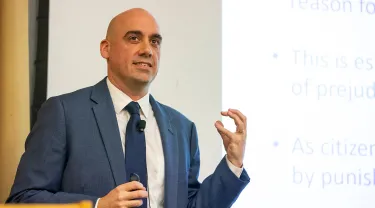In 2006, a consortium of 39 universities came together to create the Cooperative Election Study (CES), the first truly large-scale and cooperative academic survey project aimed at studying American elections.
Playing a leadership role in that effort is Brian Schaffner, Tisch College’s Newhouse Professor of Civic Studies. With colleagues from Brigham Young University, Harvard, and YouGov, Schaffner and his co-PIs have produced national stratified sample surveys in excess of 50,000 respondents for every recent federal election. The survey is administered online annually and has been supported by the National Science Foundation since 2010.
In election years, the data collection occurs in two waves: a pre-election survey, from late September to late October, in which respondents answer two-thirds of the questionnaire, and a post-election session, administered in November, in which respondents complete the questionnaire. The data collection elicits information about general political attitudes, demographic factors, assessments of roll call voting choices, political information, vote intentions, and opinions about elections that have occurred.
The results serve as a foundational resource for polling experts, political scientists, and media outlets, and the survey is frequently referenced in major newspapers and peer-reviewed journals. It offers insights into how citizens view Congress, evaluate their representatives, and engage in the electoral process, and its wide-ranging inquiries provide essential context for understanding voting behaviors within various political and social frameworks. Recent iterations have explored pressing topics like gun control, immigration, taxation, and healthcare policy, aiming to gauge public sentiment and attitudes.
The data contained in the survey serves scholars in a number of ways. In general, researchers can browse indexed text to find trends and common themes across multiple surveys, allowing for a deeper understanding of the forces underlying U.S. election results. Specifically, some researchers have used it to determine how historical slavery impacts contemporary political attitudes, examining what people across the southern United States think about issues involving partisanship, affirmative action, race relations, and equality. Others have used it to understand how Americans have historically held their congressional representatives accountable for their legislative decisions.
“Because of its size, the CES helps us answer questions that other surveys are too small to address,” explained Schaffner. “For example, understanding what drove some 2012 Obama voters to support Trump in 2016 is something you can only do with the CES.”
